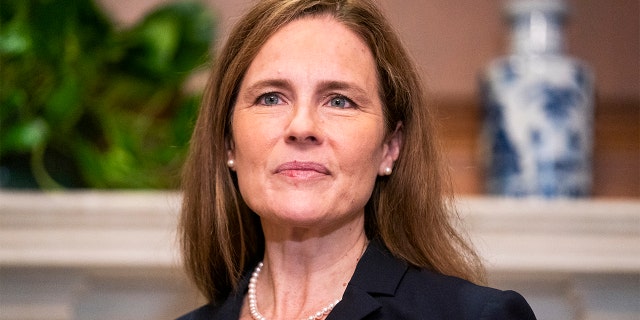After Barrett confirmation, Coons calls for effort to 'rebalance' federal courts

Coons accuses GOP of rushing Barrett confirmation through Senate
Senate Judiciary Committee member joins ‘The Story’ to discuss his concerns about future of Obamacare
Sen. Chris Coons said Monday that there needs to be a "wide-open conversation" on the ideological balance of the federal courts after the Senate for four years has doggedly focused on confirming Trump nominees to the Supreme Court and to the benches of the country's lower courts.
Under the guidance of Senate Majority Leader Mitch McConnell, R-Ky., who has embraced the mantra of "no vacancy left behind," Republicans have confirmed 220 Trump-appointed judges to those courts. That includes Judge Amy Coney Barrett, who will take the judicial oath administered by Chief Justice Roberts and officially assume her Supreme Court duties sometime Tuesday.
Coons, D-Del., who is a member of the Senate Judiciary Committee, made the comments in a conversation with MSNBC host Rachel Maddow after Barrett was confirmed 52-48 on Monday night with no Democrats voting for her confirmation.
'We've got to have a wide-open conversation about how do we rebalance our courts," Coons said. "Yes, the two Supreme Court cases that have been stolen, where these processes that are just wildly hypocritical have been used to jam through partisan nominees. But we've got to look at our federal courts as a whole."
Coons added: "Because they've seen hundreds of conservative judges put on circuit courts and district courts all over the country over the last four years. In many cases, too young, too unqualified and too far right to be allowed to sit peaceably without our reexamining the process, the results and the consequences."
The Constitution gives federal judges lifetime tenure so it is unclear what Coons might mean on examining the "results" of what are constitutionally appointed judges, even if Democrats believe them to have been jammed through in poor form. But like the Supreme Court, the Constitution gives Congress discretion over the number of federal judges in lower courts, ostensibly to allow the federal judiciary to adapt as its workload and population distribution around the country changes.
So expanding the lower courts to include more judges — and thus more Democrat appointees if Democrats manage to take the Senate and White House in next week's election– is an option that would be available to Democrats.
A large-scale expansion of the federal judiciary under former President Jimmy Carter is the reason why despite the emphasis placed on judges by the president and Senate Republicans, Trump trails only Carter in all-time numbers for federal judges appointed by this point in his presidency. There were simply more vacancies for Carter to fill because Congress created them.

Supreme Court nominee Amy Coney Barrett meets with Sen. Martha McSally, R-Ariz., not pictured, Wednesday, Oct. 21, 2020, on Capitol Hill in Washington. Barrett will be sworn in as a justice on Tuesday. (Jim Lo Scalzo/Pool via AP)
Coons' comments come as many Democrats, including in the Senate, have openly called for the packing of the Supreme Court in response to the Barrett confirmation. Court-packing is a term that was coined under former President Franklin Delano Roosevelt when the president, frustrated that the Supreme Court continually ruled his New Deal policies unconstitutional, floated a proposal that would have added several ostensibly friendly justices to the nine-member bench.
It was derided by members of both parties, and eventually the idea died when the court at the time began ruling in favor of Roosevelt's New Deal programs. That reversal was called "the switch in time that saved nine."
Another Judiciary Committee Democrat, Sen. Richard Blumenthal of Connecticut, also issued a nonspecific warning of "consequences" for the Barrett confirmation in a floor speech Monday.
"The fact is that our Republican colleagues are shattering the norms and breaking the rules and breaking their word, and there will be consequences," Blumenthal said. "There inevitably are consequences when one person breaks his or her word to another."
He later added: "Nothing less than everything is at stake. A shift in the balance of the court that will last for decades if we do not correct it – and believe me, there are appropriate measures that should be considered."
The federal courts have again become a major campaign issue thanks to the Barrett confirmation fight and the court-packing threats from some on the left. Democratic presidential nominee Joe Biden and his running mate, Sen. Kamala Harris, D-Calif., both have refused to this point to say whether they would pack the Supreme Court if elected.
Biden did, however, say in an interview with Fox 2 Detroit that he will "make clear" his position on the issue around the time when the Senate votes on Barrett, meaning that it is possible he will come out with a firm stance on the issue in the coming days.
Source: Read Full Article

